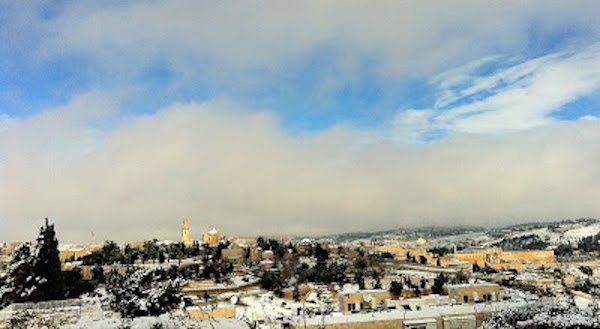Islam Has Never Denied the Jewish Connection to Jerusalem.
On the contrary, anywhere you look in early Islamic literature, if it discusses the city at all you’ll find its Jewish connection.
Religion, every religion, is the No. 1 enemy of nationalism. But under conditions of tension, such as tribal warfare, these polar opposites combine into a toxic soup that consumes all common sense.
Since the Six-Day War of 1967, the Israeli-Palestinian conflict has been on a path that is a dark tunnel linking these two poles. The poisonous blend of religion and nationalism not only drives mad all the inhabitants of the land, Jews and Muslims alike; even worse, the prolonged conflict over the protected land also drives them to change their religions.
When both sides put Jerusalem above their greatest joy, with their own hands they sever the nationalist branch they purport to nurture and to exalt. This Jerusalem, to which everyone’s eyes are turned, has no connection to the monotheism whose name they purport to carry.
And so, with the deepening of the occupation and the conflict has come the dissolution of the abstract, monotheistic God. Bit by bit, God is fragmented into rocks and stones. In so doing, they turn the city into a symbol of idolatry.
Everyone knows about the religious ruling — signed by over 100 rabbis and above all by Israel’s Ashkenazi and Sephardi chief rabbis, who represent Orthodox Judaism — that prohibits Jews from being on the Temple Mount, for reasons having to do with ritual purity and impurity. But nationalism, or to use its Israeli name, religious Zionism, has come out against that ruling. This teaches us that the conflict drives nationalists out of both their minds and their religion.
The deepening occupation and the ongoing conflict are also driving the other side out of their minds and their religion. I’ve discussed this at length in articles I have published in Arabic. Islam has never denied the Jewish connection to Jerusalem. On the contrary, anywhere you look in early Islamic literature, if it discusses the city at all you’ll find its Jewish connection.
There is a plethora of examples. For instance, it’s no accident that the ancient name of Surah al-Isra, the chapter of the Koran that discusses the Prophet Mohammed’s legendary journey from Mecca to Jerusalem and his ascension to heaven, was Surah Bani Israil, that is, the Surah of the Children of Israel.
There is a debate within Islam over the direction in which Muslims originally prayed. Some claim that Muslims prayed toward Mecca from the start, while others claim that they initially prayed toward Jerusalem. Ancient and canonical Muslim traditions cite Mohammed referring to Jerusalem as Qibla al-Yahud, meaning the Kaaba of the Jews. (The Kaaba in Mecca is Islam’s holiest site.) The reference is to the rock on which the Dome of the Rock was built in the seventh century.
Muslim commentators also discuss Al-Aqsa Mosque, which appears in the Koran as Suleiman’s Mosque or Suleiman’s Temple — in other words, Solomon’s Temple. Such commentaries even cite a tradition, or hadith, attributed to Mohammed, who said of the First Temple: “Solomon son of David raised [it]with gold and silver, with rubies and emeralds.” The tradition also says that this temple was destroyed twice, but all its looted contents are destined to return to it when the Mahdi comes, the Messiah who will restore our ancient glory.
Islamic literature places a special emphasis on the “rock” over which the golden dome was built in the seventh century. The famous 14th-century Muslim religious authority Ibn Qayyim al-Jawziyyah — a student of Ibn Taymiyyah, whose works are foundational to the Muslim Brotherhood — sums up the importance of this “rock” as follows: “The most sublime element of this rock is that it is the Qibla of the Jews, and the rock’s status in space is like that of the Sabbath in time.” In other word, the sanctity of this rock in Jerusalem is like the sanctity of the Sabbath day.
Because this site, with all its Jewish baggage, also became holy to Islam early on, and because for many generations, Muslims could say, “The whole mosque is in our hands,” the situation today is very complicated.
So what do we do now? We could wait for the Mahdi or the Messiah. Except that in the meantime, a great deal of blood would be spilled on this altar of idol worship.
*
Haaretz, Oct. 21, 2106
***
For Hebrew, press here

